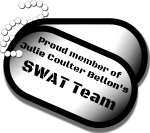When I was about three, my mom said, “What do you want to be when you grow up?” I think she was expecting me to say, “A mommy, like you.” Instead, I popped off with, “I want to be a writer.” I can still remember her face. She said, “Well, don’t you think you need to learn to read first?”
I didn’t think so.
Terry Bohle Montague is a BYU graduate and a free-lance writer, having written for television, radio, newspaper, and magazines including The Ensign and Meridian Magazine. She has also been published as the author of book length historical non-fiction and fiction.
Her non-fiction work includes the book, Mine Angels Round About, the story of the LDS West German Mission evacuation of 1939 which occurred only days before the Nazi invasion of Poland.
Her LDS fiction, Fireweed, is loosely based on her interviews with the evacuated West German missionaries and their families.
Terry studied with Dwight Swain and Jack Bickham, as well as David Farland. Her writing awards include those from LDS Storymakers, Idaho Writers’ League, and Romance Writers of America.
 Lisel Spann has dreamed only of wonderful things in her future. Living with her father, sister, and brother in a cramped apartment in Berlin, the small family shares what seems to be an unbreakable spirit of love and security. However, with the rise of the Nazi party and approaching dark clouds of war, any kind of future grows increasingly uncertain. Knowing little of hate and destruction, Lisel is ill prepared as the storms of battle erupt in full fury and loved ones are taken from her as her beautiful city is reduced to rubble.
Lisel Spann has dreamed only of wonderful things in her future. Living with her father, sister, and brother in a cramped apartment in Berlin, the small family shares what seems to be an unbreakable spirit of love and security. However, with the rise of the Nazi party and approaching dark clouds of war, any kind of future grows increasingly uncertain. Knowing little of hate and destruction, Lisel is ill prepared as the storms of battle erupt in full fury and loved ones are taken from her as her beautiful city is reduced to rubble.
With fear and despair rising within, it is through her quiet, compassionate father that Lisel discovers faith and hope. Now, in a desperate journey to find her sister, Lisel and her neighbor flee Berlin and the advancing Russians for Frankfurt, a city under the protection of the Allies. But their flight to safety is filled with pain, hunger, and terror. However, with spiritual lessons and blessings from her father, the support of departed loved ones, and her tried but undying faith in a loving Heavenly Father, perhaps Lisel can emerge like the fireweed—rising strong and beautiful from scorched earth transforming
bitterness and despair into a charity that never faileth.
bitterness and despair into a charity that never faileth.
Pick up your copy today
Excerpt 1
In the middle of June, loudspeakers in factories, shops, restaurants, and street corners blared out national and party anthems followed by the announcement that Paris had been captured. Then the current hit was played, “We March on England.” There was no cheering. No celebration. Glumly, the Germans went back to their activities without comment.
Lisel heard the news with mixed feelings. How tired she was of war! Tired of greasing hand grenades! Tired of worrying about her brother, Michael, somewhere in France. Tired of worrying about Kurt! Tired of ration coupons and long lines! Tired of being tired! But, surely, the war almost over. The newspapers said by Christmas. Then Michael would be home. By Christmas, she would be finished with her Compulsory Service.
By Christmas, Papa would have their genealogy. By the New Year, if they were careful with their money, they would be in America. By the New Year, perhaps, they would have gone to the temple.
Grete began dropping in again that summer, usually on Sunday afternoons when she knew Lisel was home. She talked of school, and the people they both knew and of movies she had seen and of a handsome officer she had met. Lisel wondered if Grete was more impressed by the black Horsch the officer drove than by the officer himself. But then Grete would go on and talk of marriage and babies and the house she wanted to live in.
Lisel listened with weary indulgence. She did not share Grete’s romantic aspirations with any enthusiasm. Lisel’s daydreams had more to do with sleeping and eating than with boys. And when she did think of men, she thought of Kurt and was saddened. Of course, most of the men had been drafted. Now, their LDS branch was made up of women, children, and older men. They had even lost two branch presidents to the military in the first six months of the year.
In the middle of July, Hitler offered Great Britain a no-strings-attached peace. He said there was no reason Germany and Great Britain should war again each another. If there was war, it was only because Great Britain forced it.
Within four days, the British bombed Bremen, Hamburg, Paderborn, Hagen, and Bochum.
Herman Goring, Hitler’s defense minister, had promised no enemy aircraft would ever penetrate the Reich. Now, resentment soared and morale plummeted. The Germans bad been promised peace, but they had gotten only bombs.
To Berlin, Goering made further assurance that though enemy aircraft might fly over Germany, they would never reach the capital. He even told them not to worry if an air raid siren went off. They should become alarmed and hurry into the shelter only if they heard the anti-aircraft guns.
So, when the women in the Wittenau Munitions Works heard the wail of air raid sirens one night in late summer, they paused only long enough to look up their trays of grenades. But then, within moments came an unfamiliar sound. Like a loud, harsh barking. For a heartbeat, Lisel stood listening, puzzled. Her blood chilled. “It is the gun,” she said under her breath, not quite believing it. “It is the antiaircraft gun!”
Lisel caught a glimpse of Herr Hahn as he leapt upon his desk. “Get to the cellars!” He screamed. “Get to the cellars!”
Then everyone was running. Pushing for the doorway. Fighting for the stairs. Behind Lisel, she heard the rolling balla-balla-balla sound of flak. The women scrambled, stumbled down the dark stairs. They crowded into the cellar beneath the Munitions Works. It smelled damp and musty.
Herr Hahn slammed down the cross piece that barred the heavy door and found this way to the center of the room, where he stood under a single bulb that hung from the ceiling. “Calm yourselves! Calm yourselves! He shouted at the women. “You will each find a seat on the benches or sit on the floor. If you have your gas mask, put it on. But above all, be calm.”
Lisel pushed her way to an inside wall where Susanne stood, as if in shock, her normally cheerful face drawn and pale and her brown eyes glazed. “We must sit, Susanne,” Lisel said, taking her friends’ icy hands and pulling her to the floor, where they sat with their backs against the wall.
Around her, she heard the other women weeping and swearing and praying. Lisel’s teeth wanted to chatter but she gritted them. She squeezed Susanne’s hand. “It will be all right soon, she said. Dumbly, Susanne nodded. Tears streaked her face.
Lisel shut her eyes on her own burning tears and sent up a fervent appeal. “Father, please protect us. Protect Papa and Marta and Michael and Kurt.”
From overhead, she heard the hum of an aircraft as it flew low over the Works. Then, again, the bark of the antiaircraft gun. Heavy flack fell with a wuuu-ummm sound then a slow rolling echo.
“Why are they doing this to us?” Susanne cried out. “Why are they doing this?”
(Continue on with Excerpt 2 on another blog)
Follow along on Facebook
https://www.facebook.com/events/795423343911119/
And on these great blogs
http://semishort.blogspot.com/
|
http://rebeccalamoreaux-anauthorinprogress.blogspot.com/
|
a Rafflecopter giveaway














0 comments:
Post a Comment